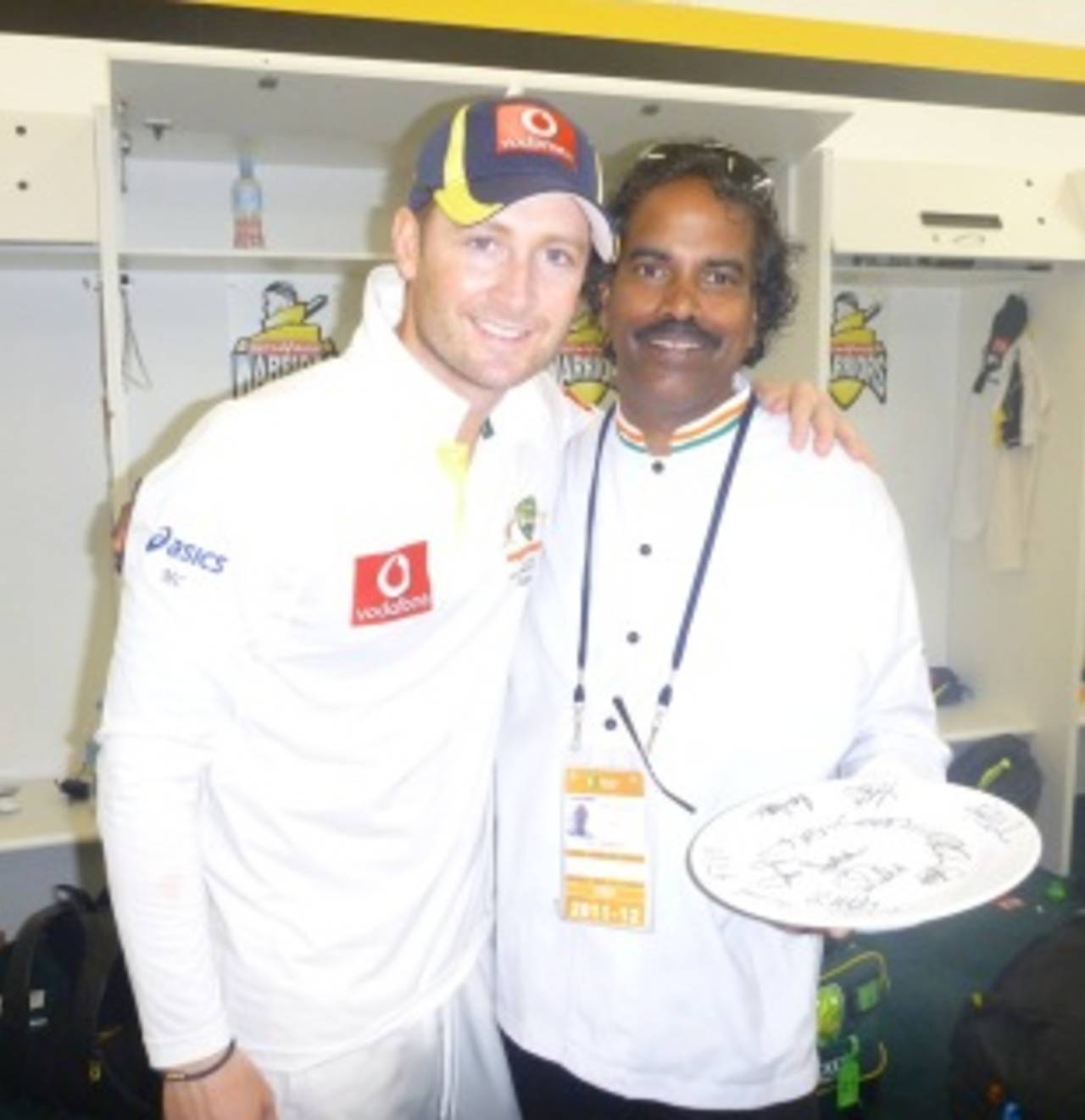It is the high point of India's ugly tour of Australia four years ago. The teams have landed in Perth. Before the Test, they go for their respective group dinners. Turns out they are both looking to eat at Gogo's Madras Curry. They won't have it any other way.
So Gogo - Govardhan Govindaraj, a chef of Indian origin who now is the official team chef during Test matches in Australia - creates a temporary partition in his restaurant, which is actually an old house on Beaufort Road in Mt Lawley. One living room has one team, and the courtyard the other. The blinds are brought down, and the restaurant is shut to the public. Word spreads, news channels and reporters get a whiff, and want to know if the teams are kissing and making up at Gogo's Madras Curry.
Inside, Gogo is worried by the awkwardness of the situation. The staff continue to serve the teams, and Gogo calls up his Western Australian friend, Justin Langer, who comes and sits alternately with both teams to ease some of the awkwardness. It's a time when the two teams can't come together on any issue, but Gogo's food has brought them under one roof, even if there is not much camaraderie. Anil Kumble, India's captain, later left behind for Gogo the ball with which he took his 600th wicket, during India's win in Perth.
You can understand the Indian team wanting to eat Indian food, but it's the Aussies who love Gogo more. Walk into the restaurant and you feel you have entered a cricket museum. Steve Waugh has left his book here with a signature saying, "Thanks Gogo for the best lamb shanks." John Buchanan has left a long message. Glenn McGrath's boots with a message, "Ooh aah Glenn McGrath." Wasim Akram played his last Test here in Perth; his captain's cap is here. Akram swears by Gogo's food.
During the 1999-2000 tour, Pakistan were in Australia and they were fasting. They needed proper food in the evenings. Gogo had just catered for a swimming championship in Perth. WACA called him up. He has cooked for the Australian team at every home Test since then. There is a bond between Gogo and the Australian team now. The tired exhausted players come back to the change room, and shout, "Gogo, feed me." His lamb shanks are the celebration dish after major wins. After the match Gogo can be found in the changing rooms. His closeness with the Australian players, he feels, left the touring Sri Lankans not too enamoured.
Gogo's career as a chef began when he - unlike other Chennai kids back then - dropped out of engineering against his father's wishes and studied hotel management. He joined Maurya Sheraton in India, and then landed up in Japan. An earthquake there sent Gogo to Perth, where he worked as a chef at Orchid Hotel for three-and-a-half years.
In between came Gogo's first experience of cooking for sports teams, when AC Milan landed in September 1995. He saw how particular the coaches and fitness coaches were about what the players ate. "They also flew the chef here," Gogo says. "And they brought all their stuff from Italy. Pasta, beans, coffee … I told the chef he didn't have to worry about anything.
"Their guidelines are completely different. It's not like cricket. Very controlled diet. There is a dietician and a coach standing next to you. They know each and every payer, and how much he can eat. If he tries one extra scoop they take away the spoon. The only thing extra they are allowed is coffee shots." Gogo is now a qualified dietician himself.
Catering for the Indian team is a challenge. There are various kind of vegetarians. One of Gogo's colleagues remembers the Indian team coming back from the Bradman Oration shouting, "Gogo, dal-chawal; Gogo, sambhar …"
You would think Shane Warne was similarly challenged when he took baked beans to India, but Gogo feels it is all a bit of media baloney. "Even in 1980s they used to get - because I come from a hotel background - the best continental food in five-star hotels," Gogo says. "The chefs in 1970s or '80s from hotel-management schools were not trained for Indian food. When you graduate from hotel management school, the chef's speciality is French-based cuisine. How can you falter in continental food? Only in the 1990s did the Indian food concept start in five-star hotels in India."
How does an Indian manage to be the beloved chef of the Australian team, though? "If you know how to cook real Indian food, you can cook any food," Gogo says. "I have had this argument with Italian, French, great chefs. The reason is our cooking covers all aspects of cooking. If you know pan India, from Kanyakumari to Kashmir, they even have cuisine that you dig a hole in the ground, put mud there, have a bonfire, and eat in the morning. Tandoor. Mohenjo-Daro. Harappa style of cooking. You are talking of BC. When a guy is thorough in Indian cuisine, he can cook anything in the world."
Gogo has souvenirs from many cricketers - Australian of course, Indians, South Africans, West Indians, Pakistanis - but he has found Matthew Hayden the most fun. Hayden would go inside the kitchen and cook with Gogo, who has contributed a chapter to Hayden's cookbook. Gogo's most prized souvenir is Sachin Tendulkar's gloves. His best moment with cricket is when Australia regained the Ashes in Perth, in 2006-07. "That was the best. The best team. So proud of catering for that team."
Sidharth Monga is an assistant editor at ESPNcricinfo
